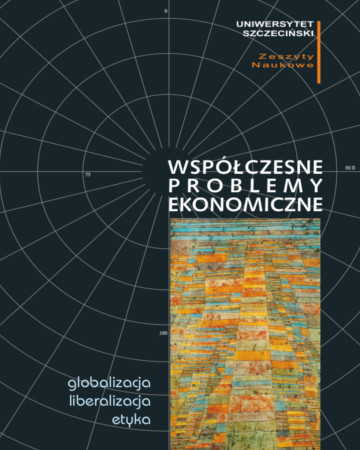
ISSN: 2081-9579
eISSN: 2353-2815
OAI
DOI: 10.18276/wpe.2016.12-11


Issue archive /
nr 12 (2016)
Infobrokering: an Ethical Challenge in the Knowledge-Based Economy
| Authors: |
Anna
Waligórska-Kotfas
Katedra Zarządzania i Logistyki, Państwowa Wyższa Szkoła Zawodowa w Koninie |
| Keywords: | infobrokering information broker infonomics information services market ethical aspects of infobrokering |
| Data publikacji całości: | 2016 |
| Page range: | 10 (125-134) |
Abstract
Modern economy is defined as the knowledge-based economy where the gathering, processing, retrieval, use, integration, and manipulation of information have become the key factors of companies’ growth. In spite of the fact that information is a concept, it can be measured in economic terms, and, as such, is treated as an intangible asset examined and valuated by infonomics. An incredible increase of information availability due to the Internet sources resulted in the recognition of a new profession – an infobroker.
The paper defines business information and its sources, and shows a role which infobrokering is playing in the business environment. In the further part, some conditions of infobrokering services are described together with the profiles of an American and Polish infobroker. Finally, the ethical aspects of an infobroker’s profession are discussed, and some ethical questions which an infobroker should be aware of are presented.
Download file
Article file
Bibliography
| 1. | AIIP, Code of Ethical Business Practice, www.aiip.org/About/Code-of-Ethical-Business-Practice (7.12.2014). |
| 2. | BabikW., Sustainable Development of Information Society: Towards an Ethics of Information, “Geomatics and Environmental Engineering” 2012, vol. 6, no. 1, p. 13−20. |
| 3. | Bates M.E., 2013 Info-Entrepreneur Report: Insights on Information Businesses, www.batesinfo.com/extras/files/2013-iip-survey.pdf (4.12.2014). |
| 4. | Bernstein J.H., The Data-Information-Knowledge-Wisdom Hierarchy and its Antithesis, NASKO 2011, 2 (1), p. 68−75. |
| 5. | Christozov D., Nikolova I., Infobroker – an Emerging Profession of Informing Mediators?,in: Proceedings Informing Science Conference, Krakow, Poland, 19–22 June 2001, |
| 6. | Krakow University of Economics, Krakow 2001, p. 136−142. |
| 7. | Cisek S., Broker informacji: istota zawodu, http://eprints.rclis.org/archive/00012296-/01/Cisek_broker_informacji_istota.pdf (6.12.2014). |
| 8. | Grala B., Kozakiewicz W., Infobrokering and Searching the Deep Web – the New Role of Employee of the Department of Medical Scientific Information, www.eahil.eu/conferences/2007Krakow/www.bm.cmuj.krakow.pl/eahil/proceedings/oral/Grala%20i%20Kozakiewicz.pdf (3.12.2014). |
| 9. | Hardcastle E., Business Information Systems, Elizabeth Hard castle & Ventus Publishing ApS, 2008. |
| 10. | Hey J., The Data, Information, Knowledge, Wisdom Chain: The Metaphorical Link, www.dataschemata.com/uploads/7/4/8/7/7487334/dikwchain.pdf (7.12.2014). |
| 11. | Hrabiec-Hojda P., Specyfika usług infobrokerskich a kompetencje informacyjne infobrokera, „Biblioteka Nostra” 2013, no. 1 (31), p. 87−95. |
| 12. | Laney D., Infonomics: The Economics of Information and Principles of Information Asset Management, The Fifth MIT Information Quality Industry Symposium, July 13−15, 2011, p. 590−603. |
| 13. | Nizioł K., Infobrokering w Polsce − wyniki badań w środowisku praktyków zawodu, „PTINT Praktyka i Teoria Informacji Naukowej i Technicznej” 2010, no. 4, p. 3−19. |
| 14. | Nowak P., Polska w rankingach gospodarek opartych na wiedzy, „Prace Komisji Geografii Przemysłu Polskiego Towarzystwa Geograficznego” 2013, vol. 22, p. 22−43. |
| 15. | OECD, The Knowledge-Based Economy, Paris 1996. |
| 16. | OECD, WBI, Korea and the Knowledge-based Economy: Making the Transition, Paris 2000. |
| 17. | Pindlowa W., Cisek S., Grey Literature as an Information Source for Small and Medium-Sized Business, in: Konferencja międzynarodowa – VIII Międzynarodowe Seminarium Informacji Naukowej Krajów Europy Środkowej i Wschodniej, Warszawa, 11–12 X 1999, OPI, Warszawa 1999, p. 47−53. |
| 18. | Powell W.W., Snellman K., The Knowledge Economy, “The Annual Review of Sociology” 2004, no. 30, p. 199–220. |
| 19. | WBI,Knowledge Assessment Methodology, http://web.worldbank.org/ (7.12.2014). |
| 20. | Davenport T.H., Prusak L., Working Knowledge: How Organizations Manage What They Know, Harvard Business School Press, 1998, p. 2−6. |